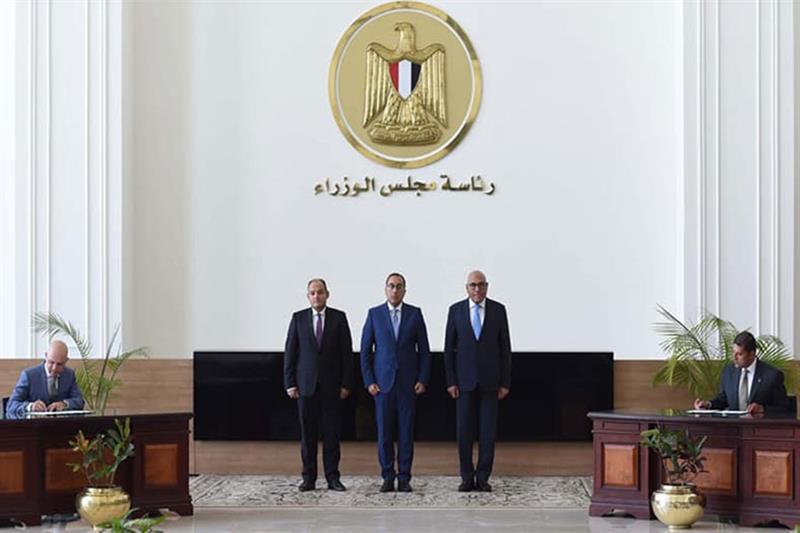
Left to Right: Egypt's Minister of Trade and Industry Ahmed Samir, Prime Minister Mostafa Madbouly, and Head of the Arab Organization for Industrialization Mokhtar Abdel-Latif stading during the signing the MoU on Tuesday 30 August, 2022. (Photo courtesy of Egyptian Cabinet)
Prime Minister Mostafa Madbouly attended the signing ceremony of the MoU, which aims to expand vehicle manufacturing cooperation between the government and the Dutch company.
Headquartered in Amsterdam, Stellantis is a multinational automotive manufacturing corporation formed in 2021 as a 50:50 merger between French Peugeot SA ("Groupe PSA") and the Italian-American conglomerate Fiat Chrysler Automobiles NV ("FCA"). Stellantis came fifth in 2021's global vehicle sales behind Toyota, Volkswagen, Hyundai, and General Motors.
The MoU will study how to drive further investments and boost the production capacity of the factories of Egypt’s Arab American Vehicles company (AAV), said Samir Cherfan, chief operating officer for Middle East and Africa in Stellantis.
AAV has represented a successful model of integration between national and foreign industrial investments for more than 45 years, the cabinet statement cited Cherfan as saying.
Established in 1977, the Cairo-based vehicle assembling company AAV is a joint venture between the military Arab Organisation for Industrialization (AOI) and Chrysler Group LLC. AAV has assembled many car models since its establishment, including for civilian and military use.
The MoU between GAFI and Stellantis today comes in light of the support provided by the government’s national automotive industry strategy to encourage companies working in this sector to invest further in the Egyptian market, Mohamed Abdel-Wahab, GAFI CEO, said.
In June, Egypt launched the national strategy to develop and localise the automotive industry in order to make Egypt one of the main gateways for the African vehicle market and to build strong commercial and investment relations with regional trade partners.
The strategy also includes the Egyptian Automotive Industry Development Programme (AIDP), which provides the required framework to develop existing car assembling and manufacturing capacities and encourage new investments in this sector.
By 2035, Egypt’s vehicle market is expected to surpass five million vehicles from 1.1 million currently, Cherfan said.
He expected the national automotive strategy to enable Egypt to become a vehicle exporter to regional and African markets, including electric eco-friendly vehicles.
Stellantis is working on expanding its chain of suppliers regarding vehicle feeder industries and providing opportunities to attract new investments in this sector, Cherfan said.
The field of feeder industries has successfully allowed Egypt to export to Europe and various global markets, making it one of the largest exporters of vehicle components, Cherfan added.
PM Madbouly held a meeting with Stellantis officials in New Alamein city to review expanding the industrial activities of the company in Egypt during the coming period, the Cabinet said.
Madbouly directed Egypt’s Minister of Trade and Industry Ahmed Samir to continuously communicate with Stellantis to follow up on the expansion of the company’s activities and remove any obstacles that they may face in this regard.
Egypt’s national strategy to develop the automotive industry has included competitive incentives for investors, the premier said, affirming that Egypt is ready to facilitate all measures within the framework of the national strategy.
Egypt is seeking to become a regional hub for the automotive industry in order to cover the needs of the local market and major parts of Africa.
During a visit to the East Port Said Industrial Zone in June, Madbouly said Africa will need five million cars by 2035.
Companies willing to invest in the sector in Egypt would be well placed to benefit from this demand through the free-trade agreements between Egypt and other African countries, he said.
The government is designing incentives programmes to encourage the localisation of the automotive industry, Madbouly said, adding that more will be offered when companies introduce new technologies and improve their environmental impact.
After launching the national automotive strategy, Egypt has met with major automotive companies, who, according to Madbouly, have affirmed their willingness to invest in the region.
One day after launching the strategy on 15 June, Madbouly witnessed the signing of an MoU between GAFI and leading Japanese company, Sumitomo, to set up a factory manufacturing electrical components for cars.
The factory is scheduled for operation before the end of 2023.
Another MoU was also signed on 14 June between the Suez Canal Economic Zone (SCZone), the Sovereign Fund of Egypt, the East Port Said Development Company, and the Egyptian International Motors Company.
The MoU aims to localise automotive and associated industries in the Suez Canal Industrial Zone east of Port Said through the establishment of a joint complex for the manufacture of vehicles and associated supplies.
In the first phase, the complex is scheduled to produce 75,000 cars annually. It will meet local and regional needs, export to different countries, and attract more international automotive companies to manufacture cars in Egypt.
Short link: